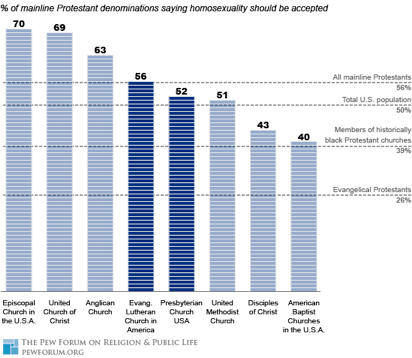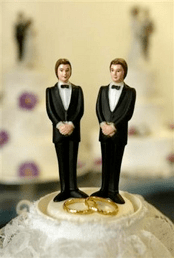
By Matthew Potts - May 12, 2009
 Nearly every mainline Protestant denomination struggles over issues of sexual ethics. Although every Protestant church aspires to live faithfully in accord with the Bible's teachings, most mainline Protestants understand biblical interpretation to be a necessary - if a necessarily difficult - step in the process of faithful living. Just as most Christians choose not to obey every legal injunction of the Old Testament, many mainline Protestants likewise believe that faithfully interpreting the ethical teachings of the Bible can occasionally lead to changes in a living tradition. Mainline Protestants often struggle to discern where faithful Biblical interpretation might lead us to leave aside even some biblical practices (like slavery, for example) in favor of a new way of being "Christian."
Nearly every mainline Protestant denomination struggles over issues of sexual ethics. Although every Protestant church aspires to live faithfully in accord with the Bible's teachings, most mainline Protestants understand biblical interpretation to be a necessary - if a necessarily difficult - step in the process of faithful living. Just as most Christians choose not to obey every legal injunction of the Old Testament, many mainline Protestants likewise believe that faithfully interpreting the ethical teachings of the Bible can occasionally lead to changes in a living tradition. Mainline Protestants often struggle to discern where faithful Biblical interpretation might lead us to leave aside even some biblical practices (like slavery, for example) in favor of a new way of being "Christian."
Often the question of homosexuality is raised in this regard. How should biblically faithful Christians feel about homosexuality? This is an immense topic, and one that we'll explore more deeply in upcoming features on this gateway through articles about the nature of biblical interpretation generally, and the question of homosexuality and ordination in particular. In this feature, however, we'd like to offer an overview of the official mainline denominational positions regarding same-sex marriage, as a way of opening up this conversation for further discussion and learning.
To start with the most apparently straightforward positions, Baptist churches tend to be opposed to gay marriage. Both the Southern Baptist Convention (SBC) and the American Baptist Churches in the USA (ABC), two of the largest bodies of Baptist governance, have made official statements in opposition to same-sex marriage. The Southern Baptist Convention stated in 2003 its intent "to oppose steadfastly all efforts by any court or state legislature to validate or legalize same-sex marriage or other equivalent unions," whereas the American Baptists resolved in 1992 that "the practice of homosexuality is incompatible with Christian teaching." The ABC hasn't commented upon same-sex marriage specifically, but its opposition to same-sex marriage may yet be safely inferred. In fact, in 2006 several American Baptist churches left the denomination when its governing body failed to penalize churches which welcomed openly gay members.
Few other churches take as firm a position on gay membership, though many more officially oppose same-sex marriage. The United Methodist Church, mainline Protestantism's largest denomination after the Baptist churches, states quite clearly in its Social Principles that marriage is a covenant of "love, mutual support, personal commitment, and shared fidelity between a man and a woman." In fact, as recently as April of 2009 the Church reaffirmed this resolution and barred clergy from performing any same-sex marriage or even any civil ceremonies. The Presbyterian Church USA (PCUSA), currently in a heated debate over the ordination of gays and lesbians, also defines marriage as between a man and a woman in its Book of Order, but the PCUSA has not made any recent statements regarding same-sex marriage and has even permitted some ministers to perform same-sex blessings. It has not lent these blessings any explicit support, however, and the Church insists that such blessings should not be understood as marriage. The Evangelical Lutheran Church in America (ELCA), meanwhile, has no official policy on same-sex unions. Although its bishops' conference has denied any basis in scripture or tradition for same-sex blessings, they simultaneously declare that they "express trust in and will continue dialogue with those pastors and congregations who are in ministry with gay and lesbian persons, and affirm their desire to explore the best ways to provide pastoral care for all to whom they minister." In actual practice, this has meant the irregular and occasional ministration of same-sex blessings in the ELCA as a means of "pastoral care" to gay and lesbian persons.
One denomination has taken the ambiguity outlined above a step further and now officially distinguishes between marriage and blessing. The Episcopal Church (ECUSA) has not altered its catechism's definition of matrimony as between a woman and man. This theological position differs from the Church's political one, however. In 2006, the denomination voiced official opposition to "any state or federal constitutional amendment that prohibits same-sex marriages or unions." What's more, in its 2003 General Convention, the Church declared that "local faith communities are operating within the bounds of our common life as they explore and experience liturgies celebrating and blessing same-sex unions." So the Episcopal Church, while choosing not to change its official teaching documents, has distinguished the theological issue from both the pastoral and the political one, in an attempt to hold several diverging opinions on same-sex union in careful tension.




